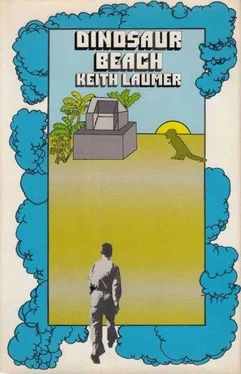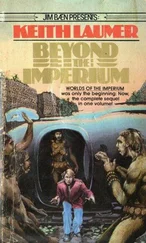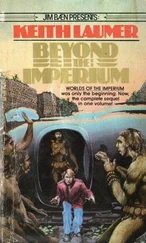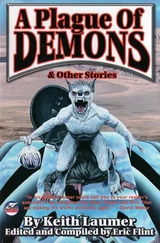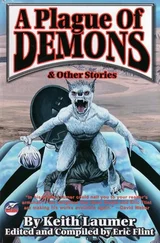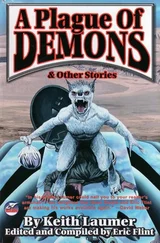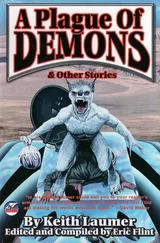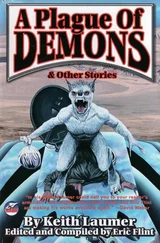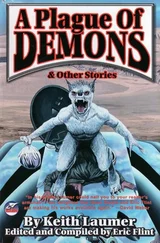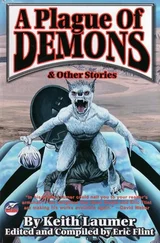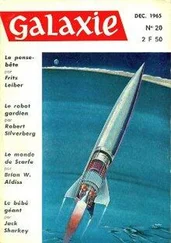Keith Laumer - Dinosaur Beach
Здесь есть возможность читать онлайн «Keith Laumer - Dinosaur Beach» весь текст электронной книги совершенно бесплатно (целиком полную версию без сокращений). В некоторых случаях можно слушать аудио, скачать через торрент в формате fb2 и присутствует краткое содержание. Год выпуска: 1971, ISBN: 1971, Издательство: Charles Scribner's Sons, Жанр: Фантастика и фэнтези, на английском языке. Описание произведения, (предисловие) а так же отзывы посетителей доступны на портале библиотеки ЛибКат.
- Название:Dinosaur Beach
- Автор:
- Издательство:Charles Scribner's Sons
- Жанр:
- Год:1971
- ISBN:0-684-12374-6
- Рейтинг книги:4 / 5. Голосов: 1
-
Избранное:Добавить в избранное
- Отзывы:
-
Ваша оценка:
- 80
- 1
- 2
- 3
- 4
- 5
Dinosaur Beach: краткое содержание, описание и аннотация
Предлагаем к чтению аннотацию, описание, краткое содержание или предисловие (зависит от того, что написал сам автор книги «Dinosaur Beach»). Если вы не нашли необходимую информацию о книге — напишите в комментариях, мы постараемся отыскать её.
Dinosaur Beach — читать онлайн бесплатно полную книгу (весь текст) целиком
Ниже представлен текст книги, разбитый по страницам. Система сохранения места последней прочитанной страницы, позволяет с удобством читать онлайн бесплатно книгу «Dinosaur Beach», без необходимости каждый раз заново искать на чём Вы остановились. Поставьте закладку, и сможете в любой момент перейти на страницу, на которой закончили чтение.
Интервал:
Закладка:
Dinosaur Beach
by Keith Laumer
This book is affectionately dedicated to Anne Taylor, RN.
1
It was a pleasant summer evening. We were sitting on the porch swing, Lisa and I, watching the last of the pink fade out of the sky and listening to Fred Hunnicut pushing a lawn mower over his weed crop next door. A cricket in the woodwork started up his fiddle, sounding businesslike and full of energy. A car rattled by, its weak yellow headlights pushing shadows along the brick street and reflecting in the foliage of the sycamores that arched over the pavement. Somewhere a radio sang about harbor lights.
A pleasant evening, a pleasant place. I hated to leave it. But I took a breath of crisp air lightly laced with leafsmoke and newcut grass and got to my feet.
Lisa looked up at me. She had a heart-shaped face, and a short nose, and big, wide-spaced eyes and the prettiest smile in the world. Even the tiny scar on her cheekbone only added to her charm: the flaw that makes perfection perfect.
“Think I’ll walk down to Simon’s for some beer,” I said.
“Dinner will be ready when you get back, darlin’,” she said, and smiled the smile. “Baked ham and corn on the cob.”
She stood and moved against me all in one fluid dancer’s motion, and her lips touched my ear.
I went down the steps and paused on the walk to look back and see her silhouetted against the lighted screen door, slim and graceful.
“Hurry back, darlin’,” she said, and waved and was gone.
Gone forever.
She didn’t know I wouldn’t be coming back.
2
A streetcar clacked and sparked past the intersection, a big toy with cutout heads pasted against the row of little square windows. Horns tooted. Traffic lights winked. People hurried past, on their way home after a long day in the store or the office or the cement plant. I bucked the tide, not hurrying, not dawdling. I had plenty of time. That was one lesson I’d learned. You can’t speed it up, you can’t slow it down. Sometimes you can avoid it completely, but that’s a different matter.
These reflections carried me the four blocks to the taxi stand on Delaware. I climbed in the back of a Reo that looked as if it should have been retired a decade back and told the man where I wanted to go. He gave me a look that wondered what a cleancut young fellow like me wanted in that part of town. He opened his mouth to say it, and I said, “Make it under seven minutes and there’s five in it.”
He dropped the flag and almost tore the clutch out of the Reo getting away from the curb. All the way there he watched me in the mirror, mentally trying out various approaches to the questions he wanted to ask. I saw the neon letters, the color of red-hot iron, half a block ahead and pulled him over, shoved the five into his hand and was on my way before he’d figured out just how to phrase it.
It was a shabby-genteel cocktail bar, the class of the neighborhood, with two steps down into a room that had been a nice one once, well before Prohibition. The dark paneled walls hadn’t suffered much from the years, and aside from a patina of grime, the figured ceiling was passable; but the maroon carpet had a wide, worn strip that meandered like a jungle trail across to the long bar, branching off to get lost among the chair legs. The solid leather seats in the booths along the wall had lost a lot of their color, and some of their stitching had been patched with tape; and nobody had bothered to polish away the rings left by generations of beers on the oak tabletops. I took a booth halfway back, with a little brass lamp with a parchment shade and a framed print on the wall showing somebody’s champion steeplechaser circa 1910. The clock over the bar said 7:44.
I ordered a grenadine from a waitress who’d been in her prime about the same time as the bar. She brought it and I took a sip and a man slid into the seat across from me. He took a couple of breaths as if he’d just finished a brisk lap around the track, and said, “Do you mind?” He waved the glass in his hand at the room, which was crowded, but not that crowded.
I took my time looking him over. He had a soft, round face, very pale blue eyes, the kind of head that ought to be bald but was covered with a fine blond down, like baby chicken feathers. He was wearing a striped shirt with the open collar laid back over a bulky plaid jacket with padded shoulders and wide lapels. His neck was smooth-skinned, and too thin for his head. The hand that was holding the glass was small and well-lotioned, with short, immaculately manicured nails. He wore a big, cumbersome-looking gold ring with a glass ruby big enough for a paperweight on his left index finger. The whole composition looked a little out of tune, as if it had been put together in a hurry by someone with more important things on his mind.
“Please don’t get the wrong impression,” he said. His voice was like the rest of him: not feminine enough for a woman, but nothing you’d associate with a room full of cigar smoke, either.
“It’s vital that I speak to you, Mr. Ravel,” he went on, talking fast, getting it said before it was too late. “It’s a matter of great importance… to your future.” He paused to check the effect of his words: a tentative sort of pause, as if he might jump either way, depending on my reaction.
I said, “My future, eh? I wasn’t sure I had one.”
He liked that; I could see it in the change in the glitter of his eyes. “Oh, yes,” he said, and nodded comfortably. “Yes indeed.” He took a quick swallow from the glass and lowered it and caught and held my eyes, smiling an elusive little smile. “And I might add that your future is—or can be—a great deal larger than your past.”
“Have we met somewhere?” I asked him.
He shook his head. “I know this doesn’t make a great deal of sense to you just now—but time is of the essence. Please listen—”
“I’m listening, Mr.—what was the name?”
“It really doesn’t matter, Mr. Ravel. I don’t enter into the matter at all except as the bearer of a message. I was assigned to contact you and deliver certain information.”
“Assigned?”
He shrugged.
I reached across and caught the wrist of the hand that was holding the glass. It was as smooth and soft as a baby’s. I applied a small amount of pressure. Some of the drink slopped on the edge of the table and into his lap. He tensed a little, as if he wanted to stand, but I pressed him back. “Let me play too,” I said. “Lets go back to where you were telling me about your assignment. I find that sort of intriguing. Who thinks I’m important enough to assign a smooth cookie like you to snoop on?” I grinned at him while he got his smile fixed up and back in place, a little bent now, but still working.
“Mr. Ravel—what would you say if I told you that I am a member of a secret organization of supermen?”
“What would you expect me to say?”
“That I’m insane,” he said promptly. “That’s why I’d hoped to skirt the subject and go directly to the point. Mr. Ravel, your life is in danger.”
I let that hang in the air between us.
“In precisely—” he glanced down at the watch strapped English-style to the underside of his free wrist “—one and one-half minutes a man will enter this establishment. He will be dressed in a costume of black, and will carry a cane—ebony, with a silver head. He will go to the fourth stool at the bar, order a straight whiskey, drink it, turn, raise the cane, and fire three lethal darts into your chest.”
I took another swallow of my drink. It was the real stuff, one of the compensations of the job.
“Neat,” I said. “What does he do for an encore?” My little man looked a bit startled. “You jape, Mr. Ravel? I’m speaking of your death. Here. In a matter of seconds!” He leaned across the table to throw this at me, with quite a lot of spit.
Читать дальшеИнтервал:
Закладка:
Похожие книги на «Dinosaur Beach»
Представляем Вашему вниманию похожие книги на «Dinosaur Beach» списком для выбора. Мы отобрали схожую по названию и смыслу литературу в надежде предоставить читателям больше вариантов отыскать новые, интересные, ещё непрочитанные произведения.
Обсуждение, отзывы о книге «Dinosaur Beach» и просто собственные мнения читателей. Оставьте ваши комментарии, напишите, что Вы думаете о произведении, его смысле или главных героях. Укажите что конкретно понравилось, а что нет, и почему Вы так считаете.
